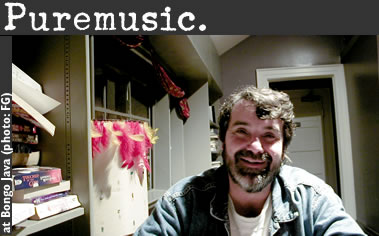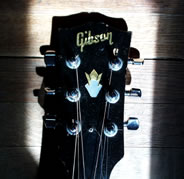 |
 |
|||||
 |
||||||
A CONVERSATION WITH DARRELL SCOTT (continued)
PM: How about "It's a Great Day to Be Alive," let's talk about that great song.
DS: The story on that is, I had back problems. I was on my back for a week, and couldn't get up. I'd get up once a day to try and sit at the table for a few minutes. I was in misery. I was in the living room on the concrete slab for awhile, till finally I was able to sit up for the first time in a week. And I wrote that song. It just all came right out. All but the last verse, which came the next day, and I was feeling better yet. I'm a real baby when it comes to pain. It was one of those things, it just came from an appreciation of being able to sit up. I literally did have rice cooking in the microwave and that's how the song begins. Of course I hadn't shaved, that's the next line, et cetera. I do that a lot, just try to write what's happening, really.
The song had been cut by several major label acts, Travis was the fourth artist to cut it. [Hear a clip on the Listen page.] In the other three cases, the artist lost their deal or management shifted, like my record. I even had female artists looking at that song, wanting me to change lines about the Fu Manchu and other manly references, but there were too many. I couldn't get there.
It was Blake, again. He was over at SONY.
PM: Blake Chancey, your champion. What a guy.
DS: Exactly. He pitched the song to the production team, or to Travis, I don't know for sure. Next thing I know, Blake calls me and says Travis wants to record the song, but there are some lyric changes he'd like to talk over. Now, I'd been performing this song for six or seven years in this circuit that I have found myself to be in, a kind of bluegrass or acoustic singer songwriter circuit, with Tim, and Sam, and Guy, you know. And I'd play it everywhere I went, for years. I'd heard the stories, I knew what the song already meant to people. People coming up after shows and laying out these honest, soulful accounts of how the song had affected their life, you know? So I was reluctant about lyric changes, because the song already had a life of its own. It came through me, and I didn't want to mess with it, on some level.
I actually talked to Marcus about it. [we laughed] So I had to live with it for a while. Travis had called, and we talked about it.
PM: And he knew exactly what he wanted to change.
DS: Oh yeah, very specifically. And that's cool to me, I respected that. He needed it to be his song, just like Sara Evans, and I agree. I'm not married to lyrics, I change them too, like we said at the top. So, eventually I moved off the place of hesitation or reluctance, but it took a couple of weeks.
PM: And he wanted you to make the changes and retain total ownership of the song.
DS: Oh yeah, it was totally cool in that and every regard. And I did finally make the changes, and we took care of it in a short conversation, and everything was set, it was great. I was camping last Memorial Day weekend. My brother was living in Atlanta, we met halfway with our families. So we're at the communal shower, and this woman who'd just taken a shower was packing up her baby into the back seat. And while she's doing this, she starts singing "It's a Great Day to Be Alive." And I'm just sitting there, alone, no witnesses, thinking, "Okay, this is cool." Songs have a life of their own.
PM: To round out the story of the big cuts, let's cover the one by the Dixie Chicks, "Heartbreak Town."
DS: I have to say, it's Blake again.
PM: This guy would be in line for a kickback at this point, if he wasn't already doing so well. [Darrell laughs]
DS: Blake and Paul Worley, the producer, called me to write with Natalie, the singer. While they're overdubbing in the studio, Natalie and I go to the back room to try and write.
PM: That's pretty wild, right?
DS: I think it was a question of the preciousness of time, you know. And what Natalie and I did was just talk, get to know one another a little. We tried to work on a song. She was talking about strangers. And that's a lot of what goes on here in town. Stranger meets stranger and try to create art together. Sometimes it works. When I came down here in the early days to write with Bill Miller, for instance. The other night, when we played that Jammin' to Beat the Blues benefit, Bill was there. I ran into him backstage, and had only seen him once at a book store since we wrote that first song eleven years ago. And we wrote a really soulful song back then. It was about his father, it was about my father, the angst about how your father is who you want to get the hell away from -- that sadness, that remorse. And we did it. And I was just down for a week, and that was my appointment with Bill Miller. And all those years later, that connection was still there. It can work.
PM: And did you find a vibe with Natalie in the studio back room that day?
DS: Something similar, but it didn't turn into a song, exactly. It did turn into us talking about music, the lousy part of it, and talking about the art of it, too. And, in talking about what kind of a song we'd like to write, I played her a few songs. One of the songs I played her was "Heartbreak Town," and she really liked it. The producer came in two or three hours later and asked if we'd gotten a song. I said no, that we hadn't. And she said, "But he played me this song I love." And I heard a couple of weeks later that they'd cut it. Then you go through the waiting period to see if it's gonna make the record. And it did, finally. [There's a clip on the Listen page.]
PM: I'm a big fan of the Minton Sparks record [see our review] that you played so well on. How did that come about, and did you enjoy that project?
DS: Oh yeah, I love her work. That was Marcus Hummon who brought me in there, he was the producer.
[We digressed into shop about clawhammer banjo and the like -- he explained how he'd never studied any instruments, and had a guitarist's view of banjo, dobro, and mandolin, et cetera.]
PM: When it comes to acoustic guitars, are you a Gibson man?
DS: You know what, just two weeks ago I bought two great old Gibsons. I bought a '63 Hummingbird. [laughter] And I'm gonna give it to my dad. It's beautiful. And I bought an all mahogany 1943 guitar that they tell me is an L-00. I bought a couple of champions there, from Music Emporium, in Lexington, MA. You know, they usually only use spruce and the like for tops, but in '43, they were running a skeleton crew during wartime, and ran some mahogany tops. It sounds great.
[I start taking a couple of pictures, and he says, "I like that lampshade over there."]
PM: So, before they kick us out of here, tell me how soon we may see this album you're working on.
DS: I've recorded 39 songs.
PM: Wow. Will you pare it down, or will it be a double album?
DS: It may be a triple album. I don't know, but I'm working hard on it right now, I go in spurts. I don't have much energy for what to do with it, but I have a great deal of energy to make this music, that's all I know.
PM: After recording 39 songs, you're not going to want to pare it down to 12.
DS: No, I recorded all 39 for a reason. It's just Danny Thompson, Dan Dugmore, and me in the room. [Dugmore is a stunning multi-instrumentalist with a temperament like Darrell's, a sterling example of the kind of player Darrell was profiling earlier in the interview.] I love the spirit of these recordings done in my living room. We've had to deal with the learning curve on this computer-based recording gear. We're still learning how to use the machine. I was talking to Wendy Waldman, who's producing John Cowan's new record that I was doing some overdubs on, and they were using the same system. And they basically shamed me into learning the thing. They said, "You mean you have this gear, and you're going to record on ADATs next week? You're out of your mind." So I took that, and said, "Let's record on the computer next week." My good friend and engineer Miles Wilkinson had to get up on the gear in a hurry, he's also biking partners with Kenny Malone and myself. He had to roll up his sleeves in a big way.
[Unceremoniously, the 90 minute tape ran out here, and Bongo Java was closing. We walked out to our cars, and said thanks, and goodnight.]
 |
|
| print interview (PDF) | |
| listen to clips | |
| darrellscott.com | |
| read the Tim O'Brien interview | |
| puremusic home | |
| archives | |
| artists a-z |